The LDA Podcast: An Exploration of Evidence-Informed Approaches to Learning and Development
Originally spearheaded by noted learning scientists and consultants, Will Thalheimer and Matt Richter, and originally called Truth In Learning, the updated, upgraded, and rebooted LDA Podcast explores all aspects of the Learning and Development field- validated tools and resources for better training, debunked learning models, controversies in the industry, and so much more. Now hosted by Matt and Clark Quinn (another noted scientist and consultant, the podcast will dive deeply into what makes learning and development more effective and beneficial for its end-users, stakeholders, and practitioners. Along with our monthly and general episodes, we will also offer a monthly series on AI, hosted by AI expert, Markus Bernhardt. Over the upcoming season, The LDA Podcast will: -- Keep you current with L&D research and innovations -- Unpack complex ideas and concepts -- Sharpen your critical thinking skills -- Stimulate your L&D grey cells (although this objective may not be evidence-based) N...
Episodes

Sunday Mar 03, 2024
Sunday Mar 03, 2024
Matt and Clark are so happy to have our dear friend and colleague, Elham Arabi join for the episode. In this show, we explore the nuance, and sometimes vague aspects, of culturally responsive learning and how that intricately ties to research and practice. In other words, what are the business cultural facets that affect learning initiatives. What norms, standards, values, and political schema all have impacts?Matt shamelessly references his own model for why stakeholders say no... (1) They don't buy the premise-- they don't accept the problem as stated. (2) They don't buy the solution. They accept the problem as stated, but not the solution you offer. (3) Or, they accept the problem AND the solution as offered, but don't like or trust you to deliver it.Elham referenced Adam Grant's book Think Again: The Power of Knowing What You Don't Know. If you want to watch the debate between Clark and Will, you will have to join LDA at the platinum level to access the video here: https://ldaccelerator.com/joinMatt references Self-Determination Theory (SDT). SDT is a widely research theory for how people are motivated. The premise is that all humans have three basis psychological needs (autonomy, competence, and relatedness). When those needs are met, one is more likely to be intrinsically motivated toward a task. When they are undermined, one is like to be more extrinsically motivated, or not motivated at all. The theory was initially devised and studied by Edward L. Deci and Richard M. Ryan while they were at the University of Rochester. Here is a link to an article Matt wrote on the topic in context to learning: https://ldaccelerator.com/lda-blog-1/open-the-motivational-door-and-let-the-learners-in-and-keep-them. The checklist Matt references can be found here: https://ldaccelerator.com/motivation-checklist.Clark references Amy Edmundson and her work on Learning culture: https://hbr.org/2008/03/is-yours-a-learning-organization and Harold Jarche's talks about how well you share with others: https://jarche.com/2014/02/the-seek-sense-share-framework/. Clark also references Geert Hofstede and his work on Cultural Dimensions. Mindtools offers a nice summary here: https://www.mindtools.com/a1ecvyx/hofstedes-cultural-dimensionsElham references The Culture Map: Breaking Through the Invisible Boundaries of Global Business by Erin Meyer.She also references Mark Britz and James Tyer's Social by Design: How to Create and Scale a Collaborative Company.Matt highlights Thiagi's SPARK Model for Trust: Selflessness, Predictability, Authenticity, Relatedness, and Know-How.Matt referenced the Heterodox Academy founded by Steven Pinker, founder here: https://heterodoxacademy.org/You can find Elham on LinkedIn here: https://www.linkedin.com/in/elhamarabi/More on Elham... She is an award-winning learning designer and global consultant in corporate and higher-ed with more than 15 years’ experience in the US, South-East Asia, Europe, and the Middle East. She has championed better evaluation practices in several organizations and done practical research on evaluation to ensure efficiency and effectiveness of learning programs that lead to learning transfer and impact. She holds a PhD in Interaction and Media Sciences from the University of Nevada, where her thesis was on enhancing training design based on training evaluation to investigate the effects on training transfer.

Thursday Feb 08, 2024
Thursday Feb 08, 2024
Join us in this insightful episode of the LDA Podcast as we delve into the fascinating world of AI with Jennifer Solberg, CEO of Quantum Improvement Consulting. Discover the cutting-edge intersection of technology and human performance, explore the real-world applications of AI in learning and government sectors, and unravel the hype vs. reality of AI in our daily lives. Jennifer brings her expertise in learning science, defense training, and AI collaboration, offering a unique perspective on the future of AI in enhancing human capabilities. Tune in for a deep dive into the collaborative dynamics of AI and its impact on learning and development.You can find out more about Jennifer here:https://www.linkedin.com/in/jennifersolberg/https://www.quantumimprovements.net/
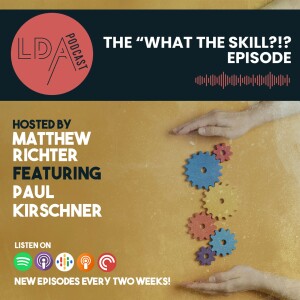
Thursday Jan 25, 2024
Thursday Jan 25, 2024
In this episode, Matt is joined by the eminent educational psychologist, Paul Kirschner. Paul is truly one of the most qualified humans on the planet to talk about our topic this episode-- skills. The word skills is bandied about all over our industry. And we all agree it is important for people to develop skills. But, what do we mean by skills? Have we perhaps oversimplified this concept? During the episode, Paul and Matt hit several specific areas related to this often used, extremely important, but still ill-defined concept (at least within our industry)- skills:What is a skill? What are complex skills? What are generic skills? Domain-specific skills?What is the cognitive architecture?Can skills be taught? What about leadership? Creativity? Etc.? Of course... you know the answer... it's nuanced!From an instructional design perspective, how should we go about teaching “skills.”What are the mistakes educators and trainers make when it comes to skills?What are the misconceptions we have about skills?How should we test whether a learner can perform a skill and what do those tests tell us?Then there is Cognitive Load Theory..., Oh my!And, more!There are many places you can find Paul. But, the best place is at his blog, 3-Star Learning Experiences.Paul has written several books. Some of our favorites, of which many of the subjects touched upon here, are delved into deeply there. They include, but are not limited to:Ten Steps to Complex LearningHow Learning Happens: Seminal Works in Educational PsychologyEvidence Informed Learning DesignUrban Myths about Learning and EducationMore Urban Myths about Learning and Education We also have a bit of a conversation about John Sweller. John is an Australian educational psychologist best known for formulating the influential theory of cognitive load. A wonderful YouTube video of John talking about cognitive load is here.And if you want to see a quick video of Paul... Here you go... one from a few years ago... https://ldaccelerator.com/giants-in-ld/paul-a-kirschner.
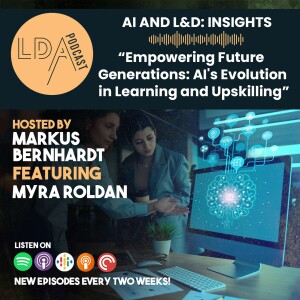
Thursday Jan 11, 2024
Thursday Jan 11, 2024
In this episode of AI and L&D Insights, Markus and Myra Roldan explore the rapid evolution of AI in learning and development. They discuss the impact of large language models and AI tools on upskilling, emphasizing the importance of ethical AI use and diverse representation in the field. Myra shares insights on integrating augmented and virtual reality with AI for immersive learning experiences and highlights initiatives like Amazon's educator enablement program and youth engagement programs. This episode is a thought-provoking journey into AI's transformative role in education and workforce preparedness.And here are the links referenced and the way to find Myra.Notebook LM https://notebooklm.google/Notion https://www.notion.so/Bloks https://www.bloks.app/manifestoFathom https://fathom.video/AWS Machine Learning University https://aws.amazon.com/machine-learning/educators/Myra RoldanConnect with me on LinkedIn: http://www.linkedin.com/in/myraroldanWebsite: https://www.learnwithmyra.online/
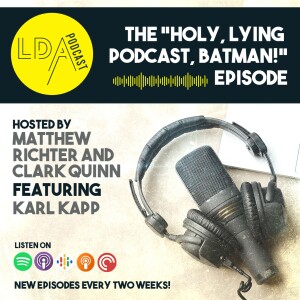
Thursday Dec 28, 2023
Thursday Dec 28, 2023
This episode’s topics: Is AI cheating? What is the impact on intellectual property? Learner assessment? Heck, even job replacement? These questions are both philosophical and pragmatic. What about the value of critical thinking... and does AI take that application away? We explore ways to use AI more effectively... but recognize we cannot even fathom some of the consequences, yet.In the spirit of Christmas and Santa Claus, is it ok to ever lie to your learners? What is the value of the "white lie?" What is fiction in the context of learning? Is it a lie? How do we use or adapt case studies? We discuss the more nuanced, ethical questions related to the truth in the context of learning.Joining Matt and Clark is Karl Kapp. Karl is a professor of instructional technology and the Director of the Institute for Interactive Technologies at Bloomsburg University. He is also the founder of the Learning and Development Mentor Academy where he offers tons of self-paced workshops and live sessions for seasoned L&D professionals. He also co-founded Enterprise Game Stack, a company that designs, develops and delivers online, digital card activities and games that keep participants focused, engaged, and collaborative, while reinforcing learning both in the moment and over time. You can find Karl on LinkedIn here: https://www.linkedin.com/in/karlkapp/ And on his website here: https://karlkapp.com Episode Notes:Matt refers to the book, Everybody Lies: Big Data, New Data, and What the Internet Can Tell Us About Who We Really Are by Seth Stephens-Davidowitz. https://www.amazon.com/Everybody-Lies-Internet-About-Really-ebook/dp/B01AFXZ2F4/ref=sr_1_1?crid=32XE7RFU8662&keywords=Everybody+lies&qid=1703693836&sprefix=everybody+lies%2Caps%2C98&sr=8-1 Karl refers to Damned Lies and Statistics by Joel Best. https://www.amazon.com/Damned-Lies-Statistics-Untangling-Politicians/dp/0520274709/ref=sr_1_1?crid=1NIS0ITNOKV1A&keywords=lies%2C+damned+lies%2C+and+statistics&qid=1703693953&sprefix=Lies%2C+damned+li%2Caps%2C92&sr=8-1 Clark refers to Cognitive apprenticeship: Teaching the crafts of reading, writing, and mathematics by Allan Collins, John Seely Brown, and Susan E. Newman. https://psycnet.apa.org/record/1989-98135-013Scott Page wrote The Model Thinker: What You Need To Know To Make Data Work For You. https://www.amazon.com/Model-Thinker-What-Need-Know-ebook/dp/B07B8D3V9V/ref=sr_1_1?crid=12ZCGDWY9C3GI&keywords=The+Model+Thinker&qid=1703694035&sprefix=the+model+thinker%2Caps%2C98&sr=8-1And, Scott is from the University of Michigan.
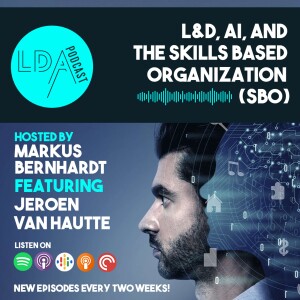
Thursday Dec 14, 2023
Thursday Dec 14, 2023
In this episode, Markus and Jeroen van Hautte dive into the world of AI and L&D, but with a specific view towards the future of the Skills Based Organization (SBO). Jeroen shares his views on the future of work, the impact AI is going to have, and how it all fits in with the skills piece - in L&D, in HR, and in the wider organization.Jeroen is the co-founder and CTO of TechWolf, an AI start-up revolutionizing workforce skill management for global clients like Booking.com, GSK and United Airlines. A top graduate of Cambridge University, he's recognized by Forbes '30 Under 30' for his contributions to AI and mentorship in engineering. As an advisor and thought leader, he maintains a strong connection to research while steering TechWolf's product vision and fostering an inclusive, customer-driven engineering culture.You can find Jeroen and TechWolf on LinkedIn here:Jeroen: https://www.linkedin.com/in/jeroenvanhautte/TechWolf: https://www.linkedin.com/company/techwolf/ TechWolf's website is: https://techwolf.com/Two more links referred to in the show are:A guide to building a resilient ecosystemA guide to building the foundations for your skill-based organisation
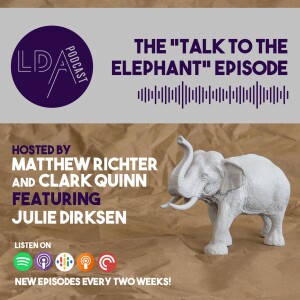
Thursday Nov 30, 2023
Thursday Nov 30, 2023
Clark and Matt are joined by instruction design guru and all around fantastic human, Julie Dirksen. Julie has been in the business for over 15 years creating highly interactive and more importantly, highly effective eLearning experiences for clients all around the world. But, Julie is more than that! She is one of the those go-to people in the industry. She is an expert that many other experts in our industry turn to and call a researcher translator. Meaning she digs into core issues… practical issues, in the work learning practitioners do. She figures out what the research says, and then puts it into succinct, useful bites that are immediately applicable. Her first book, DESIGN FOR HOW PEOPLE LEARN is one of those rare books in L&D that broke out and became a best seller beyond the industry. It is the go-to book for designers and trainers. Today, Clark and I get to talk with her about latest book, TALK TO THE ELEPHANT, DESIGN LEARNING FOR BEHAVIOR CHANGE. We talk about systems thinking and how the system can affect the factors that influence how and why one behaves as one does. We explore the individual factors such as motivation, incentives, and environmental factors. And more! As Clark will say in the episode, TALK TO THE ELEPHANT is a wonderful complement, a companion, to DESIGN FOR HOW PEOPLE LEARN. We originally planned to talk with Julie for just 20 minutes, One hour later… we were still going and felt like we could go on forever. Julie also joins us at the end for Best and Worst. You can find Julie at: https://usablelearning.com.Julie rattles off so many models and tools throughout the show, we recommend you simply buy the book to get more on each, as well as their respective references. For the links she directly references, here they are:The change ladder survey link is on the book page:https://usablelearning.com/elephant/ Julie’s "best" was Casey Fiesler. Her video on Fair Use is here:https://www.youtube.com/watch?v=D2PuntvfN20 Casey has a shorter version here that skips the wolf-themed erotica: https://www.youtube.com/watch?v=FuDEgnxkGDg) The syllabus for her tech ethics course on tiktok is here:https://docs.google.com/document/d/1tWdqYqYBHARbZXFQX4cybe88S-0twqvUu1xLhYnLgU4/edit?usp=sharing
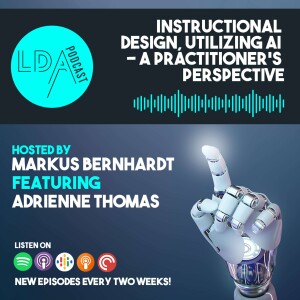
Thursday Nov 16, 2023
Thursday Nov 16, 2023
In this episode, Digital Creator and Instructional Designer Adrienne Thomas takes us on a personal journey through the AI tools landscape, from the front line perspective of an experienced practitioner. Adrienne shares with us her personal journey, how she deploys AI tools in her day to day work and the value she derives from them, as well as her experiences from the courses she delivers where she introduces others to these tools and their applications.You can find Adienne here: https://digitalwisdom.life and on LinkedIn: https://www.linkedin.com/in/adwthomas/.Her course, coloring book and AI coaching is included on her linktree.Here are the links referenced in the episode:Gamma App: A new medium for presenting ideas, powered by AI. Create beautiful, engaging content with none of the formatting and design work.- https://gamma.app/Pictory's powerful AI enables you to create and edit professional quality videos using text, no technical skills required or software to download: https://pictory.ai/Animoto: https://animoto.com/Canva is a free-to-use online graphic design tool. Use it to create social media posts, presentations, posters, videos, logos and more: https://www.canva.com/Midjourney: https://www.midjourney.com/Linktree: https://linktr.ee/ourdigitalwisdom
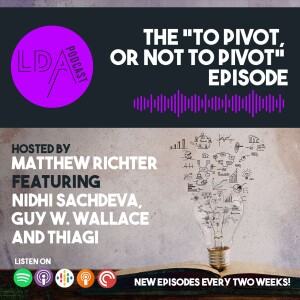
Thursday Nov 02, 2023
Thursday Nov 02, 2023
In this episode, we offer up three independent segments. Matt Richter is joined first by Nidhi Sachdeva. Nidhi is both an evidence-based learning designer and a researcher. She just completed her PhD in the spring, and the two talk about the differences between learning and performance. Then, Guy Wallace is in the house. Guy needs no introduction, having been a performance analyst and instructional architect for a few decades now. We talk about his latest book, The L&D Pivot Point, published by LDA Press. Finally, in our third segment, the inimitable Thiagi joins Matt for a new series we will intermittently run called “A Person of Interest.” Thiagi shares his biography… his story with us.You can find Nidhi most easily on LinkedIn here: https://www.linkedin.com/in/nidhi-sachdeva-toronto/, or her blog with Jim Hewitt here: https://scienceoflearning.substack.com Guy can be found here: https://eppic.biz/guy-w-wallace-2/ And, Thiagi here: https://thiagi.com. Nidhi references the work of Paul Kirscher, John Sweller, and Richard Mayer and their article, Why Minimal Guidance During Instruction Does Not Work: An Analysis of the Failure of Constructivist, Discovery, Problem-Based, Experiential, and Inquiry-Based Teaching. You can find it here: https://www.tandfonline.com/doi/epdf/10.1207/s15326985ep4102_1?needAccess=true Matt & Nidhi refer to the cognitive architecture and instructional design when discussing complex skills. He references the Sweller, van Merrienboer, and Paas article from 1998: Cognitive Architecture and Instructional Design found here: https://link.springer.com/article/10.1023/A:1022193728205 They also deviate and start talking about SDT (Self-Determination Theory), and you can learn more about that here: https://selfdeterminationtheory.orgAnd, Matt wrote an article about SDT in the context of learning found here: https://ldaccelerator.com/lda-blog-1/open-the-motivational-door-and-let-the-learners-in-and-keep-them The 85% Rule for Optimal Learning can be found here: https://www.nature.com/articles/s41467-019-12552-4 Scott Rigby and Richard Ryan, Glued to Games: How Video Games Draw Us In and Hold Us Spellbound. https://psycnet.apa.org/record/2012-01778-000 Guy’s book, The L&D Pivot point can be purchased here: https://ldaccelerator.com/the-ld-pivot-point Thiagi studied with Albert Elsen. Here’s more info about him: https://honorsandawards.iu.edu/awards/honoree/1453.html BEST AND WORST REFERENCES:Daniel Willingham Tik Tok on the fallacy of rereading for studying. Ok… there are a ton of Tim Tok videos by Dan. We aren’t sure exactly which one she referred to, but after going through several to find it, we recommend the whole darn Willingham channel. It’s great. https://www.tiktok.com/@daniel_willingham
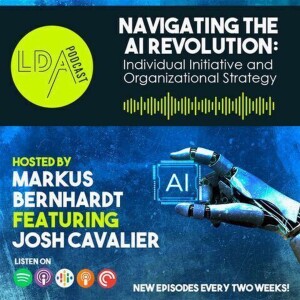
Thursday Oct 19, 2023
Thursday Oct 19, 2023
In this episode, Markus and Josh delve into the transformative impact of Artificial Intelligence on both organizations and individual professionals. They emphasize the urgency for individuals to proactively engage with AI technologies, particularly in the fields of education and corporate training. The discussion also navigates through the ethical and strategic complexities that accompany this technological shift. Tune in to gain insights into how individual initiative in AI adoption could be a decisive factor in career and organizational success.Links referred to or promised in the episode: Classes https://go.joshcavalier.com/masterclass Patreonhttps://www.patreon.com/JoshCavalier 150+ Prompts for Educationhttps://www.joshcavalier.com/150Prompts YouTubehttps://www.youtube.com/@joshcavLinkedIn: https://www.linkedin.com/in/joshcavalier/








